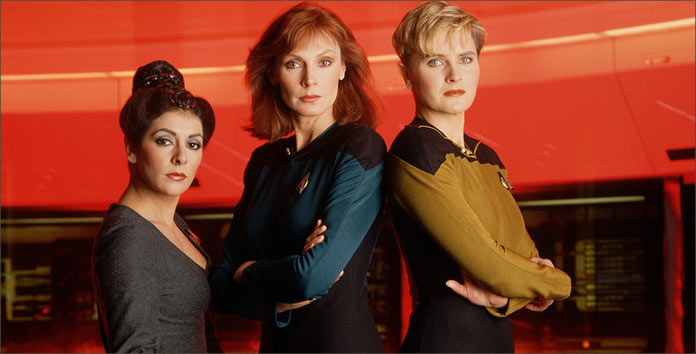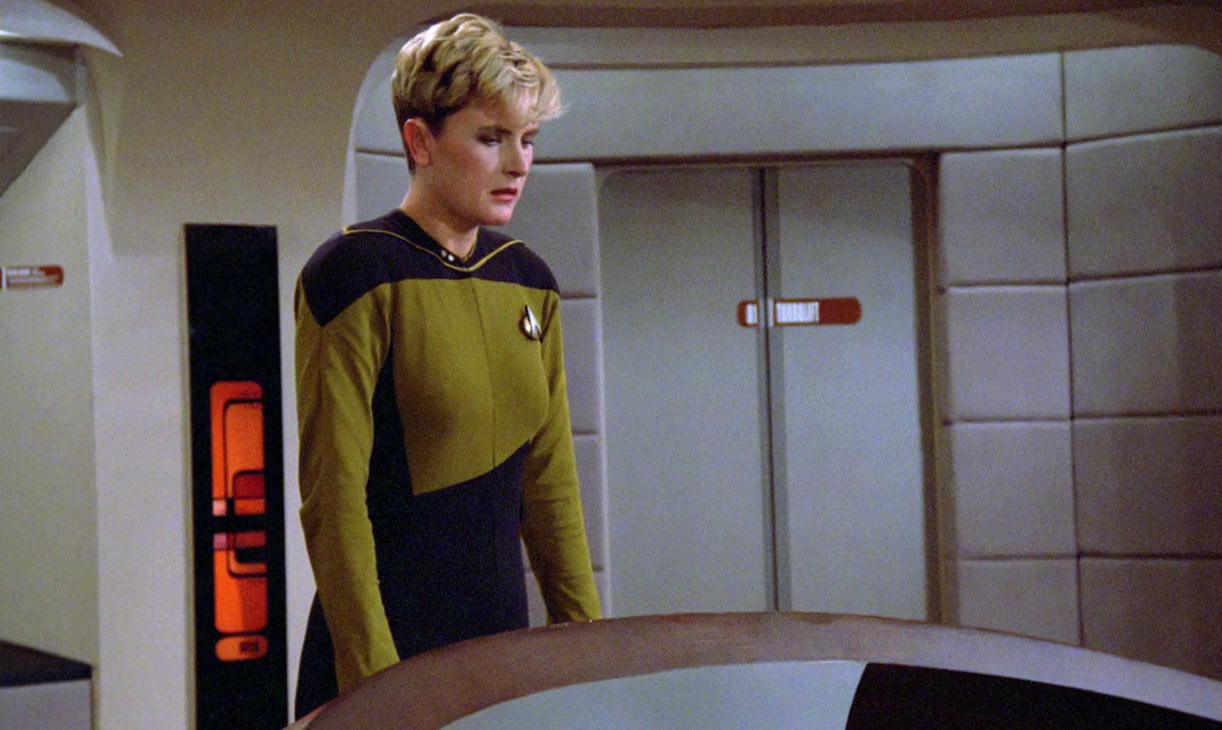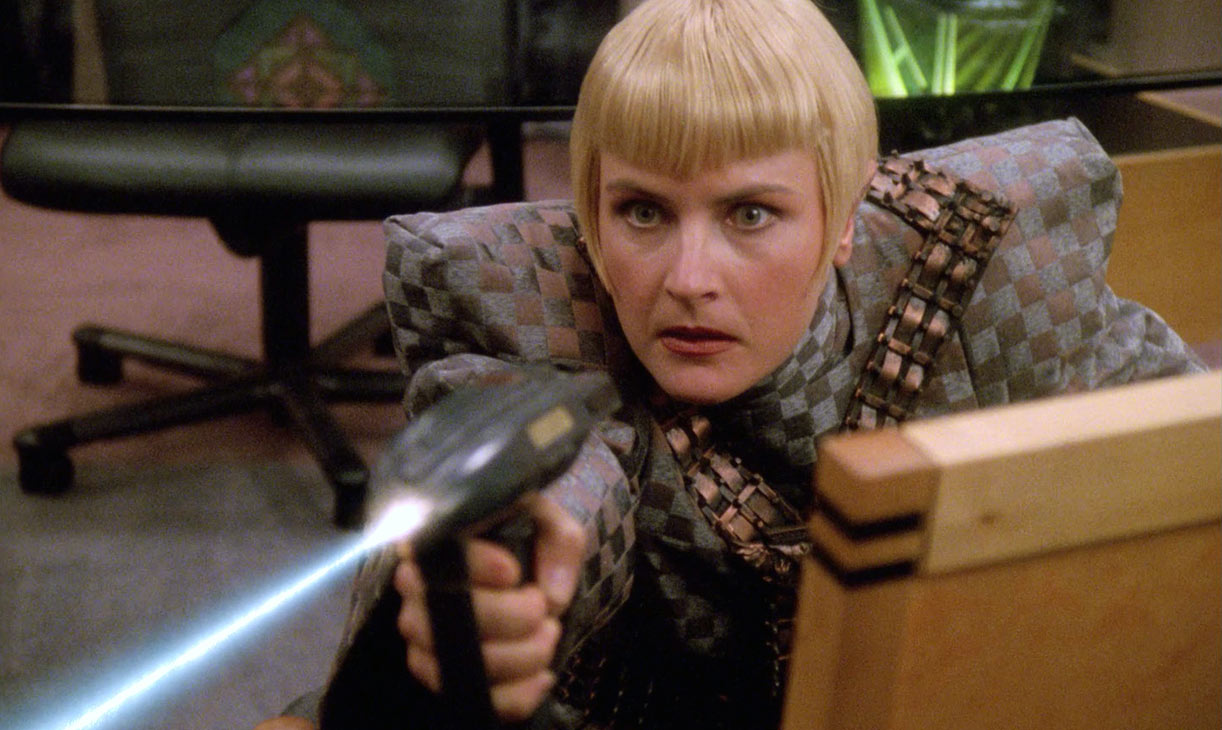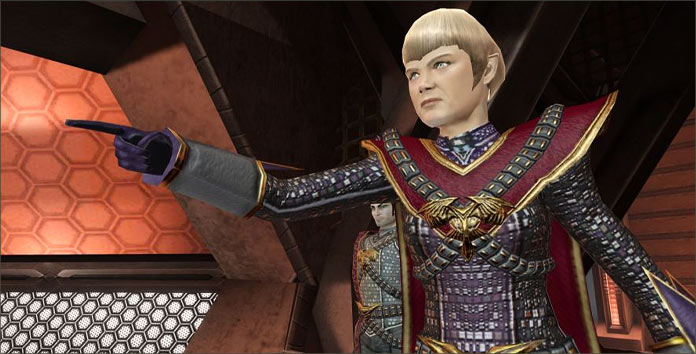Denise Crosby just hasn’t got the adoration of Star Trek fans to fall back on; she has a long career to be proud of and is a “school of hard knocks” veteran actress who knows all about the dark corridors of Hollywood.
She has worked with some of the best of people in the what could be considered the worst of times for the industry. The 1980’s made up a decade of great inequity and Denise Crosby was there to see and learn from it. She got to share some of those lessons learned at Fan Expo Canada, when I caught up with the one-time security officer at the end of August.

Before she signed up for Starfleet, Crosby spent 1983 as part of the cast of the romantic comedy The Man Who Loved Women. While it was a great opportunity for the actress and gave her access to some of the brightest stars of the day including Burt Reynolds, Julie Andrews and Kim Basinger, she also had the chance to work for the legendary Blake Edwards. While it seemed like a dream opportunity, there were some teaching moments and hard lessons learned.
“I I was as green as they came at that point. I remember driving to the set – it was a house in Malibu. My first scene, in typical Hollywood fashion, it was a love scene with Burt and along comes Kim Basinger to join the fun. It’s a threesome – and that was my first scene,” she recalled. “I had been fitted with wardrobe by multi-Oscar-winning Anne Ross. She had designed this lovely, sexy little lingerie. I’m in bed with Burt and Blake wants to shoot all the love scenes in one week, so he can get to the good stuff, and all the previous women were nude.”
Blake Edwards had to be one of the most influential producers/directors in Hollywood in the eighties. The amount of pressure that was on Crosby at this time was clearly obvious in her tone as she related the story.
“I come out in my little lingerie and in my robe, and he says ‘No! No! You gotta have nothing on.’ And I was like a deer in headlights. And Anne says ‘Blake, this is actually sexier.’ He said back to her, ‘No, the other girls were nude – they did it – that’s how we’re doing it.’ I was all of 25 years old, and I didn’t know that I could have said no – and here we go: Me Too,” she shared.

“Haskell Wexler, the Director of Photography looked at me and said ‘I got you,'” Crosby continued. “You don’t see anything in the film, but to do that to an actress, you know, now that I’m this age, and in hindsight, is not okay. And literally, I would have been fired if I stood up. But it ended up being an initiation by fire. The only one who’s got your back is yourself.”
Crosby connected that moment to the film industry of today.
“The whole point of #MeToo is to go forward to a different place with different rules. Women don’t have to be victims of this. The younger actresses, I hope, aren’t going to go through the same sort of thing we had to go through in the 80’s,” she said.
“I couldn’t go to anyone in the studio and complain that after being fitted, this guy wanted me to be naked? No-one cared. If you didn’t do it, you were out of there.”
It was clear at that moment that this meant a lot to Crosby. Her demeanor was serious and the message resonated in the room, where my daughters — who had joined me at the event — listened intently to her story.
“I have never told that story. I have done other movies with Blake. He ran a mild-mannered set and purposefully created a calm relationship with his crew,” she continued.
“I felt privileged. I had done other movies with Blake, but that was the first time I worked with him. I just think that it was part of the time when the power in the movie business completely ran amok. Men had free reign. I was just lucky I didn’t have worse things. Many women suffered, you know.”

Crosby left the cast of Star Trek: The Next Generation in 1988 under a mixed set of emotions. If she was ever going to make it as an actress, she made a sad realization that Star Trek was not where she could afford to be if she wanted to be successful.
“It was frustrating as an actor. Gene Roddenberry was very set on keeping the template he had success with on the Original Series,” Crosby recounted, thinking back to her time on board the USS Enterprise.
“There were a lot of us on that crew and TV was shifting [into] multiple storylines in TV shows, and that’s where my head was — and where I thought [The Next Generation] was going to go… and Gene corrected me. ‘It’s going to be about the captain, the first officer and Data,’ he said. So, I had to make decision – after an unheard-of 26 episodes in a season, this is not what I wanted to become an actor for. I didn’t want to stand on the bridge and say ‘aye-aye, Captain.’ “
Her insight is a teaching experience for other aspiring actors. Crosby learned early enough that it was important to be yourself, know yourself and to know what you wanted. She expanded on this idea.
“In the 80’s, there weren’t a lot of women who looked like me. I had short hair, but I was still a feminine role model in a different way that wasn’t the standard. It was a breakthrough when I walked into Gene’s office and he loved it. ‘It’s modern – let’s do it!’ He said. Now, women can be whatever they want to be.”
“As a woman you want to have equal opportunities, equal pay, a voice heard,” Crosby continued. “We’ve been silenced at times and had to continue to fight. Women are finding their call to action and it’s important when we have the opportunity to do it, to do it for the other women in other countries who don’t have the same chance.”

In her panel at Toronto’s Fan Expo Canada, Crosby recounted how she and the other female characters shared the same sense of devaluation with a humorous anecdote.
“I actually asked them to make some fake legs! You know how the bridge was elevated in the horseshoe shape? Well, all you could see were my legs above the captain’s chair. You could just stick my legs there behind and Tasha was at her post,” she laughed. “You know, Gates and Marina and I were talking: we had NO scenes together. It couldn’t be just about the girls.”
Leaving Star Trek: The Next Generation was one of the hardest decisions she had to make in her fledgling career, but Crosby was struck by a resolve that it had to happen if she wanted to break out into more recognizable roles. It was another lesson for her of the harsh environment of Hollywood.
“It was a long process. It was not a rash ‘me-coming-in-on-Monday-and-doing-this-on-Tuesday’. I ran it by everyone. Nobody wanted me to leave,” she said. “They tried, in their own way, to say it’ll get better. Then there was the final meeting with Gene and he literally told me ‘it won’t get better’. That’s when I knew I had to leave and that he was going to kill this character.”
However, there has to be something said for Crosby’s determination.
“Gene said to me: ‘You know, [if you leave] you can’t come back.’ Well we showed him!”

Of course, every Star Trek fan knows that Crosby actually did reprise the character of Tasha Yar in “Yesterday’s Enterprise” and “All Good Things…,” and she even managed to pitch a second character, the Romulan commander Sela, appearing as Tasha Yar’s daughter in multiple episodes.
“[Seeing Sela in Star Trek: Picard] would be so good,” Crosby said. “Sela wasn’t fulfilled for me. I had great ideas for that character. She also shows up in Star Trek Online. One of the lead designers for Star Trek Online just emailed me yesterday and had a meeting with a story consultant for Picard to discuss how right it would be to bring Sela into the world of Picard.”
Wishful thinking? Perhaps, as Crosby assured me she was not promising an appearance in Star Trek: Picard.
“I don’t want to be that annoying person, trying to get on to the show,” she said. “But if they asked… of course!”

The question had to be asked though: what would she take from her own experiences?
“In hindsight, one of the greatest takeaways I have from my time on Star Trek is the young women that I’m meeting that watched as a young girl and saw the possibilities of being a determined, strong, outspoken personality who wasn’t afraid – and had a right to be there. That’s my greatest love.”
After departing the series, Crosby went on to star in 1989’s Pet Sematary, became a mother, and grew an extensive filmography. In recent years, she could be seen as part of AMC’s The Walking Dead and she just finished a stint in the final season of USA Network’s Suits, a production that just wrapped filming up in Toronto.
“Your actions speak for themselves,” Crosby said, leaving me with her final thoughts. “I’ve learned that people respond to kindness, people respond to love and compassion and that’s the world I want to live in.”
![]()

 Order theStar Trek: TOSBlu-ray Collection!
Order theStar Trek: TOSBlu-ray Collection! Order theStar Trek: TNGBlu-ray Collection!
Order theStar Trek: TNGBlu-ray Collection! Order theStar Trek: Enterprise Blu-ray Collection!
Order theStar Trek: Enterprise Blu-ray Collection!